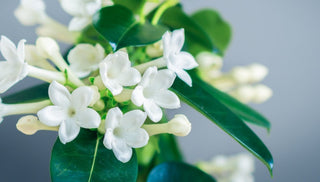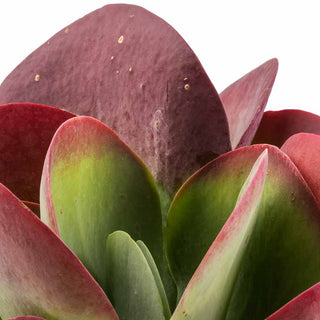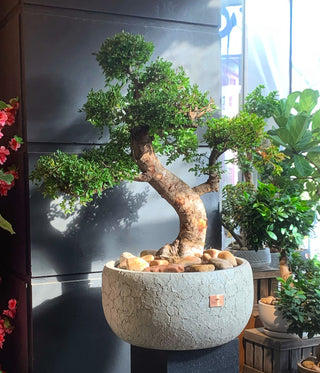☘ Origin: Madagascar
☘ Family: Apocynaceae
☘ Botanical Name: Stephanotis floribunda
☘ Common Name: WaxFlower
Symbolism: In the Victorian language of flowers, Stephanotis is the symbol of marital happiness, hence the nickname 'wedding flower'. In modern flower symbolism Stephanotis represents 'good fortune' and 'the longing to travel'.
🍃 Shop Your Madagascar Jamsine Today!
🔆 Light
The Madagascar Jasmine requires a sunny location in the home. Space near a south window and provide a trellis or support. Give your plant a turn every few days to expose all sides to light for even growth from all sides.
💧 Water
Stephanotis vines like moist but not soggy soil. Don’t try to make up for a lack of humidity by overwatering the plant; you’ll end up with root rot. Water the plant infrequently if you have a cooler, less humid environment.
To give your plant the absolute best, room-temperature rainwater and bottled spring water are your best options. Any water containing sugar or salt will hurt your plant!
☁️ Humidity
Keep a humid environment for the plant indoors or outdoors. Maintaining and tweaking humidity levels throughout the year is the trickiest part of growing this finicky plant. Discover easy ways to increase humidity for your houseplant or gently mist it 2-3 times a week using a filtered-water spray.
🌡️ Temperature
Summer temperatures are more flexible for Stephanotis flowers as long as averages remain around (22°C). They prefer cooler nights of (13-16°C).
🧴️ Food
In the spring, when the weather begins to warm, fertilize your stephanotis with a balanced flower fertilizer, following product label instructions. Fertilize the plant once a month until the winter resting time resumes.
🐾 Toxicity
All clear. Nontoxic to cats, not poisonous for dogs or horses.
Blooms are most substantial in late spring to early summer, they may flower from October to November, as well. The Madagascar Jasmine will have more flowers when it's growing in temperatures that stay about (26-30°C). Afternoon shade in the summer will help flowers from scorching.



